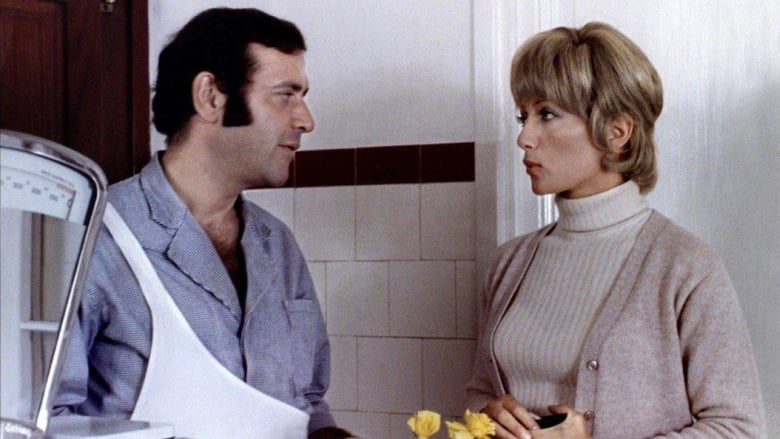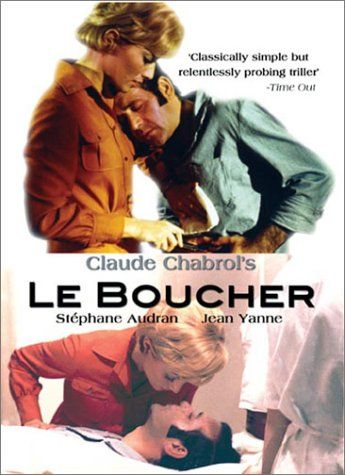← Back to Reviews

in
Top 100 films
Second movie...
Le Boucher (1970, Claude Chabrol)

Thoughts: Here is a film that seems to cross genres, as it couldn’t exactly be described as a murder mystery – the viewer knows exactly who commits the murders half way through, and it’s not really a love story, nor would I call it a drama. It works on many levels, and certainly each of those genres mentioned, the film could be categorized in, but it’s as much a study on human nature and what drives people to do reproachable things, as it is anything else. The Butcher is a great film because it refuses to fall for genre traps and like all great movies, really caters little to the audience in explaining plot. The lighter is evidence and symbolic of who the murderer is. No flashbacks are implemented. Also character’s tend to react as they might in real life – with horrible, horrible indecision and complication.
The main drive of the film is the lead actress, a stunningly beautiful Stephane Audran, who plays a school teacher, Helen, involved in a platonic relationship with the local butcher, Paul (Jean Yanne). While Helen is not apparently sexually interested in Paul, it is interesting that she initiates in all of their “dates.” The film opens with a lengthy wedding sequence (though it doesn’t even reach Deer Hunter territory thank God!) in which the two are conversing. We get the sense they’ve known of each other for years, but have no really engaged in much dialogue. Their relationship is studied through the film and it’s painful to watch one soul want more than what another soul is willing to give and the vacuum that ensues. Paul, in dealing with his rejection, could very well be second cousin to Travis Bickle.
From the eerie opening credits with the haunting harp, piano, and xylophone minimalistic music and vulgar lettering placed over images of stalagmites and caverns – a latter setting in the movie – this film is entirely unique. It could have easily gone into cliché’ thriller territory, but instead it shows a person’s curiosity not just fear guiding their actions, once they realize they are in the presence of a murderer. The remarkable thing is Helen continues to see and be acquainted with Paul once she is sure he has done the killings. It is intelligent writing and plotting, as the film is about their interactions with one another. The Butcher tends to focus more on Helen’s response to Paul and both actors are fantastic in a movie that is carried on their shoulders. One thing I realized is how the writing didn’t skim over the character’s careers and lives, but rather implemented them. So many films fall trap to the concept that characters never have to go to work in the movies they inhabit as it detracts from the plot. Here their jobs are beautifully worked into the plot and character development. The subtle music, and pastel like photography, great shots and subdued style make this a piece of cinematic art if there ever was one. The finale when Helen kisses Paul is a great moment in film, and one most American audiences would probably be aghast at. The Butcher shows a humanistic side to a murderer and gives a bruised, haunted, and lovesick soul as motive.

Best scene: Paul and Helen are out exploring the forest while mushroom hunting with the students. While getting a chance to be alone Paul questions Helen further in which she says she’s not interested in a sexual relationship. The dialogue is spoken more through implication and discreet questioning rather than direct question answer style and the viewer sees Paul squirm awaiting her cold response like a firing squad. It’s a painful and clever scene and at one point the camera slowly starts to move and slides behind a tree before allowing itself to witness heart-breaking rejection again.
&feature=related
Check about 7 minutes into the video link.
Second movie...
Le Boucher (1970, Claude Chabrol)

Thoughts: Here is a film that seems to cross genres, as it couldn’t exactly be described as a murder mystery – the viewer knows exactly who commits the murders half way through, and it’s not really a love story, nor would I call it a drama. It works on many levels, and certainly each of those genres mentioned, the film could be categorized in, but it’s as much a study on human nature and what drives people to do reproachable things, as it is anything else. The Butcher is a great film because it refuses to fall for genre traps and like all great movies, really caters little to the audience in explaining plot. The lighter is evidence and symbolic of who the murderer is. No flashbacks are implemented. Also character’s tend to react as they might in real life – with horrible, horrible indecision and complication.
The main drive of the film is the lead actress, a stunningly beautiful Stephane Audran, who plays a school teacher, Helen, involved in a platonic relationship with the local butcher, Paul (Jean Yanne). While Helen is not apparently sexually interested in Paul, it is interesting that she initiates in all of their “dates.” The film opens with a lengthy wedding sequence (though it doesn’t even reach Deer Hunter territory thank God!) in which the two are conversing. We get the sense they’ve known of each other for years, but have no really engaged in much dialogue. Their relationship is studied through the film and it’s painful to watch one soul want more than what another soul is willing to give and the vacuum that ensues. Paul, in dealing with his rejection, could very well be second cousin to Travis Bickle.
From the eerie opening credits with the haunting harp, piano, and xylophone minimalistic music and vulgar lettering placed over images of stalagmites and caverns – a latter setting in the movie – this film is entirely unique. It could have easily gone into cliché’ thriller territory, but instead it shows a person’s curiosity not just fear guiding their actions, once they realize they are in the presence of a murderer. The remarkable thing is Helen continues to see and be acquainted with Paul once she is sure he has done the killings. It is intelligent writing and plotting, as the film is about their interactions with one another. The Butcher tends to focus more on Helen’s response to Paul and both actors are fantastic in a movie that is carried on their shoulders. One thing I realized is how the writing didn’t skim over the character’s careers and lives, but rather implemented them. So many films fall trap to the concept that characters never have to go to work in the movies they inhabit as it detracts from the plot. Here their jobs are beautifully worked into the plot and character development. The subtle music, and pastel like photography, great shots and subdued style make this a piece of cinematic art if there ever was one. The finale when Helen kisses Paul is a great moment in film, and one most American audiences would probably be aghast at. The Butcher shows a humanistic side to a murderer and gives a bruised, haunted, and lovesick soul as motive.

Best scene: Paul and Helen are out exploring the forest while mushroom hunting with the students. While getting a chance to be alone Paul questions Helen further in which she says she’s not interested in a sexual relationship. The dialogue is spoken more through implication and discreet questioning rather than direct question answer style and the viewer sees Paul squirm awaiting her cold response like a firing squad. It’s a painful and clever scene and at one point the camera slowly starts to move and slides behind a tree before allowing itself to witness heart-breaking rejection again.
&feature=related
Check about 7 minutes into the video link.
